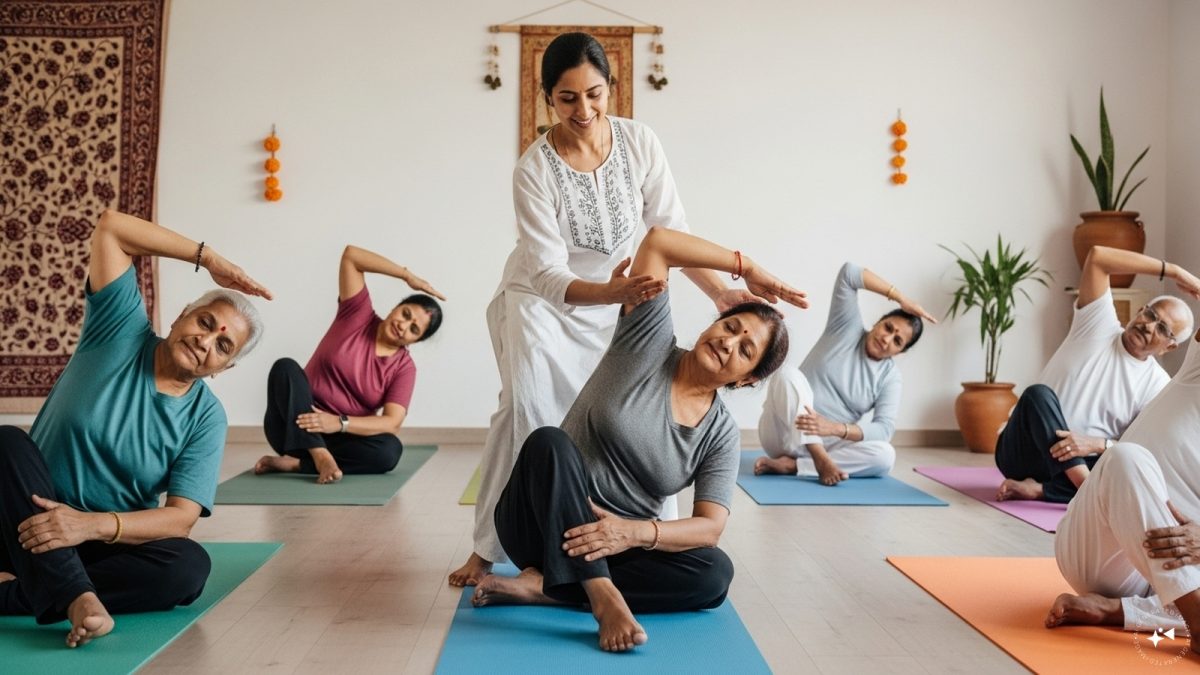Last Updated:
Thoughtfulness goes a long way in enhancing the effectiveness of Yoga for older adults. Experts outline the best ways to help elders embrace Yoga

Yoga classes for seniors must ensure safety, clarity, and help sustain their interest. (AI Generated)
Age is just a number, it is said. In reality, the body and mind do feel the years. Most of us expect age to bring some aches and ailments — from constipation, arthritis and musculoskeletal pain, to heart conditions and issues such as depression, Alzheimer’s and Parkinson’s. Loss of social roles, identity, and social networks often also lower self-esteem.
And so, we find the idea of aging scary. Yet, though aging is inevitable, it doesn’t necessarily have to be a picture of helplessness. It’s been found that functional efficiency, mental sharpness and zest for life remain intact in those who practise Yoga.
And, it is never too late to begin.
What Kind Of Yoga Can Seniors Do?
The protocol was developed by Morarji Desai National Institute of Yoga (MDNIY), designated as the WHO Collaborating Centre for Traditional Medicine (Yoga). In their book Yoga for Geriatric Population, they discuss how senior citizens’ wellbeing can be restored through Yoga practices and nutrition.
But There’s A Problem…
The guidelines are readily available, and there’s evidence that Yoga works. Not just that, seniors are mature, have life experience, and know well that Yoga is an easy method for regaining health and happiness. Studies conducted have shown that most elders are aware of it and show interest in practising it.
Yet, they often lack the motivation or physical ability to sustain or continue their practice. Yoga’s success depends on regular and dedicated practice. Given seniors’ limitations — decreased physical strength and flexibility, and specific psychological requirements — the approach to teaching them and making them practise needs special attention.
And this is where teachers and families make all the difference.
Guiding Seniors In Yoga Practice
Yoga classes for seniors must ensure safety, clarity, and help sustain their interest in Yoga.
Experts at MDNIY put it across well when they say: the instructor must embody the yogic principles of Maitri (friendliness), Karuna (compassion), Mudita (joy in others’ joy), and Upeksha (being neutral to the wicked). This would make every class an uplifting experience, and something seniors look forward to each day.
These are some principles to follow that can make a huge difference:
- Tailor Yoga to their requirements: Select a gentle, restorative style of Yoga suitable for seniors.
- Plan frequency and duration carefully: How many days a week, how long per session, and the time devoted to each Asana.
- Personalise the practice: Someone with back pain may need more Asanas for strengthening and flexibility, while a person with hypertension may benefit more from meditation and breathing practices. Modify practices rather than skipping them entirely, and use props where necessary.
- Communicate with compassion: Avoid sounding authoritarian; instead, maintain an understanding and encouraging presence.
- Enable focus: Keep the sessions short, and repeat them if needed.
- Encourage home practice: Involve family; help the individual become self-reliant, not dependent.
Progress can be tracked through simple documentation or audio-visual means. This not only shows the effectiveness of practices but also gives them a feeling of accomplishment.
Making Your Classes Even More Effective
Thoughtfulness goes a long way in enhancing the effectiveness of Yoga for older adults. Here are some tips:
- Prepare ahead by gathering complete health information. Before starting practice sessions, conduct detailed counselling. Try to get the advice of the participant’s primary physician, to understand their health condition.
- Communicate with clarity. Speak slowly, use simple words, and repeat important points. Use pictorial cards and videos.
- Speak with clear pronunciation. Speak loudly, but keep the tone calm and friendly.
- Be the instructor who radiates warmth and positivity. Remain cheerful, encouraging, and open-hearted.
- The environment matters. Sessions should be held indoors in a peaceful, quiet, pollution-free space. Ultimately, seniors must feel safe, relaxed, and able to focus fully on the practice.
With the right approach, Yoga can help seniors live not just longer but healthier, happier, and continuing to contribute, truly making age only a number.
The author is a journalist, cancer survivor and certified yoga teacher. She can be reached at swatikamal@gmail.com.









